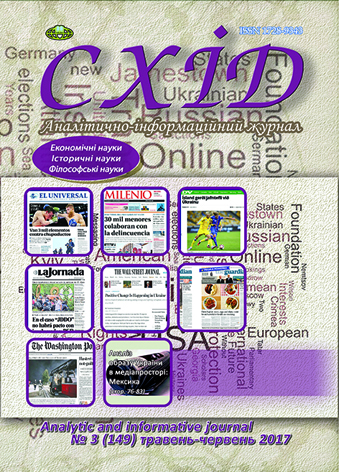Subject as a substance. Hegel as a prophet of Modernity. Three ways to understand Subject’s substantivity in Hegel’s philosophy and the imanentization of reality in modern philosophy
DOI:
https://doi.org/10.21847/1728-9343.2017.3(149).108344Keywords:
subject, Hegel, philosophism, Modernity, anthropology, theology, ontologyAbstract
In the article we can read about the interpretation of Hegel’s philosophical system in the philosophy of the XXth century. Author states that modern social reality can be considered as a consequence of philosophical reflection concerning questions, which were self-evident in pre-Modern times and didn’t need any reflection. At the same time examples of modern reflection became a canon that needed its own interpretation. Considering this fact, it has been show how relations between subject and object were comprehended (designed) in different interpretive traditions of Hegel’s philosophy and how it influenced the legitimization of a new form of social reality, which is called Modernity. There are three ways of interpreting (designing) Hegel’s philosophy depending on the fact what is understood as a subject, which should coincide with a substance: anthropologic, in which a person is understood as a subject, ontological, in the case of which subject is understood as an objective reality, and theological, in which subject is a God.
Basing on such classification, author proves that by expounding the system in Hegel’s philosophy understanding of a subject as a substance and at the same time as self-consciousness is legitimized. Subject (self-consciousness) becomes a reason and world’s logic and its history is a Spirit’s self-detection. After that an imanentization of reality and its transformation into one-dimensional one takes place, in which any other dimension is impossible in principle (logically) and the main sense of this subject is a maximum “realization” of itself in the earthly world with the greatest mastery of objectivity.
Downloads
References
Hölderlin, F. (2013), Bread And Wine, available at: http://russgulliver.livejournal.com/584105.html
Heidegger, M. (1993 The words of Nietzsche «God is dead», in: Works and reflections of different years. Moscow, pp. 168-217. Available at: http://www.nietzsche.ru/look/xxa/heider/
Hegel, G.W.F. (2015), Phenomenology of Spirit, Nauka, St.Petersburg, 443 p. (rus).
Rorty, R. (2003), From religion through philosophy to literature: the path of Western intellectuals, Voprosy philosophyy, No. 3, pp. 30-41 (rus).
Ilyenkov, E. V. (2014), The problem of the ideal in philosophy. Hegel and hermeneutics. The Book House «LIBROKOM», Moscow, 144 p. (rus).
Chayka, Tatiana (2011), Conversations with the Crymsky. Reading Hegel and Marx, Philosophska dumka, No. 3, pp. 103-111 (ukr).
Val, Jean (2006), Unhappy Consciousness in Hegel’s Philosophy, Vladimir Dal, St. Petersburg, 336 p. (rus).
Kozhev, A. (2003), Introduction to the reading of Hegel, Nauka, St. Petersburg. 792 p. (rus).
Decomb, B. (2000), Modern French philosophy, Ves Mir, Moscow, 344 p. (rus).
Heidegger M. (2015), Hegel. Vladimir Dal, St. Petersburg, 336 p. (rus).
Heidegger M. (2014-2015) Gesamtausgabe. Bd. 94-97, Vittorio Klostermann, Frankfurt am Main (germ).
Klemme, H.F. (2016), Minority as a program. The experience of reasoning about Heidegger and his criticism of the late New Times, Voprosy Philosophii, № 7, pp. 56-62 (rus).
Ippolit, Jean (2006), Logic and Existence, Vladimir Dal, St. Petersburg, 320 p. (rus).
Kurilovich, I.S. (2016), Jean Ippolit and «Phenomenology of the Spirit»: From Translation to Interpretation, Voprosy Philosophii, №2, pp. 168-180 (rus).
Ilin, I.A. (1994), The philosophy of Hegel as a doctrine of the concreteness of God and man. In two volumes. Nauka, St/Petersburg, 542 p. (rus).
Jaspers, Karl (2012), Philosophy. The second book. Enlightenment of Existence [translat]. «Canon +» of the Rehabilitation NGO, Moscow, 448 p. (rus).
Heidegger, Martin (2016), German idealism (Fichte, Schelling, Hegel) and the philosophical problems of modernity, Vladimir Dal, St. Petersburg, 496 p. (rus).
Popovych, M.V. (1997), Rationality and Measurements of Human Being Sphera, Kyiv, 290 p. (ukr).
Pasko, I.(2017), Archetypes and Culture: Poetry and Philosophy. Skhid, no. 1(147), pp. 107-112. DOI: 112 DOI: 10.21847/1728-9343.2017.1(147).97460.
Belokobylsky, A.V. (2008), Basis and strategies of rationality Modern, PARAPAN, Kyiv (ukr).
Downloads
Published
How to Cite
Issue
Section
License
Copyright (c) 2017 Victor Levytskyi

This work is licensed under a Creative Commons Attribution-NonCommercial-NoDerivatives 4.0 International License.
1. Authors bear responsibility for the accuracy of facts, quotations, numbers and names used.
2. Manuscripts are not sent back.
3. The publisher does not always agree with the authors' opinion.
4. The authors reserve the right to authorship of the work and pass the first publication right of this work to the journal under the terms of a Creative Commons Attribution-NonCommercial-NoDerivatives 4.0 International License. This license allows others to distribute (copy) the published work for non-commercial purposes, provided there is mandatory attribution to its authors and a link to the first publication in our journal.
5. The authors have the right to conclude separate supplement agreements that relate to non-exclusive work distribution in the form in which it has been published by the journal (for example, to upload the work to the online storage of the journal or publish it as part of a monograph), provided that the reference to the first publication of the work in this journal is included.

